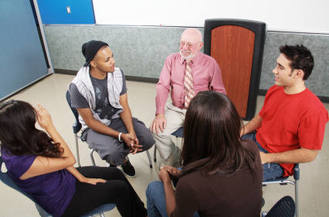What are the treatments?

Teen depression comes and goes, so why treat it?
Your child has a greater chance of having depression again after having it the first time. There is also an increased risk of substance abuse, eating disorders, and unsafe behaviors. There are life and death consequences for letting teen depression go untreated. Please get your child help!!
There are a multitude of methods to treat depression: medication, family therapy, faith, cognitive behavior therapy, and hospitalizations or residential treatment for severe cases. Most teens respond well to a combination of the above to get the best results. They will also need support from their family, friends and school to develop a safe and healthy plan.
Information on Medications shown in the Medications link at the bottom of the page and may give you a better picture of the different kinds of medication, what they treat and what their possible side effects are.
Therapy
There are many types of therapy and therapists. Please get your teen's input on how he or she feels about the therapist. Listen to your child because you can make them go to therapy, but if your teen does not feel a rapport with that therapist, they will not share.
Having a counselor whose specializes in teen or adolescent therapy is also very important, as medications and therapy can be different for this population and it is best to have a specialist work with your teen.
Cognitive Behavioral Therapy (CBT) This therapy focuses on arming the teen with strategies such as problem solving and changing negative thinking patterns that will help the teen engage in activities and reduce their stressors like social interactions.
Interpersonal Therapy is helpful for treating mild to moderate forms of depression. Improving how people relate with each other can sometimes be effective in helping treat their depression. Studies show that having a multi-pronged approach of medication and therapy to treat the depression is nearly twice as effective.
Your child has a greater chance of having depression again after having it the first time. There is also an increased risk of substance abuse, eating disorders, and unsafe behaviors. There are life and death consequences for letting teen depression go untreated. Please get your child help!!
There are a multitude of methods to treat depression: medication, family therapy, faith, cognitive behavior therapy, and hospitalizations or residential treatment for severe cases. Most teens respond well to a combination of the above to get the best results. They will also need support from their family, friends and school to develop a safe and healthy plan.
Information on Medications shown in the Medications link at the bottom of the page and may give you a better picture of the different kinds of medication, what they treat and what their possible side effects are.
Therapy
There are many types of therapy and therapists. Please get your teen's input on how he or she feels about the therapist. Listen to your child because you can make them go to therapy, but if your teen does not feel a rapport with that therapist, they will not share.
Having a counselor whose specializes in teen or adolescent therapy is also very important, as medications and therapy can be different for this population and it is best to have a specialist work with your teen.
Cognitive Behavioral Therapy (CBT) This therapy focuses on arming the teen with strategies such as problem solving and changing negative thinking patterns that will help the teen engage in activities and reduce their stressors like social interactions.
Interpersonal Therapy is helpful for treating mild to moderate forms of depression. Improving how people relate with each other can sometimes be effective in helping treat their depression. Studies show that having a multi-pronged approach of medication and therapy to treat the depression is nearly twice as effective.
Find more facts...
Depression statistics and information was found in the following:
National Institute for Mental Health (NIMH)
World Health Organization (WHO)
National Alliance for the Mentally Ill (NAMI)
Suicide Awareness Voices of Education [online] National Mental Health Association,“Fact Sheet: Suicide”
depressionstats.com
teendepression.org
National Institute for Mental Health (NIMH)
World Health Organization (WHO)
National Alliance for the Mentally Ill (NAMI)
Suicide Awareness Voices of Education [online] National Mental Health Association,“Fact Sheet: Suicide”
depressionstats.com
teendepression.org



